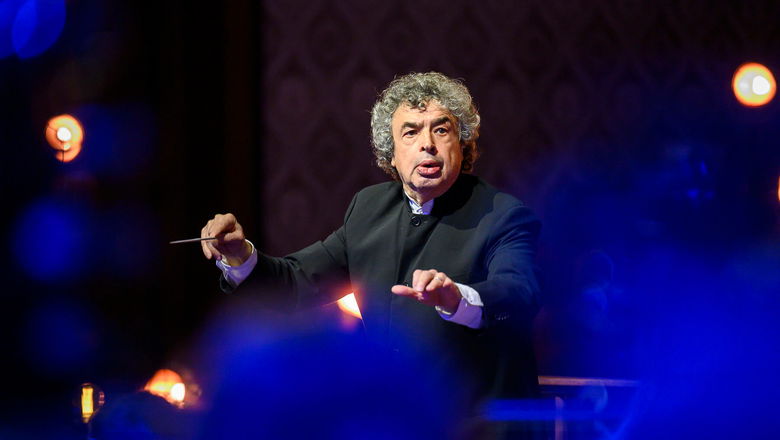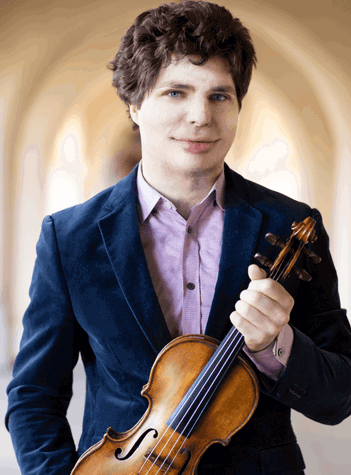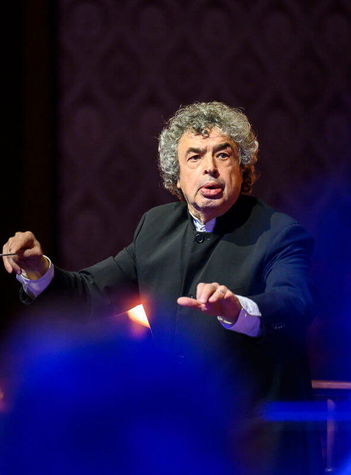Programme
Antonín Dvořák
In Nature’s Realm, concert overture, Op. 91 (12')
Antonín Dvořák
Violin Concerto in A minor, Op. 53 (32')
— Intermission —
Antonín Dvořák
Symphony No. 8 in G major, Op. 88 (38')
Secure your seat for the 2025/2026 season – presales are open.
Choose SubscriptionThe beginning of the season belongs to Antonín Dvořák in part because the beginnings of the Czech Philharmonic are associated with him personally. The orchestra will be playing Dvořák programmes not only at the Rudolfinum, but also on its tour of Asia. At the opening concert we will be welcoming for the first time the outstanding Augustin Hadelich.
Duration of the programme 1 hour 45 minutes
Antonín Dvořák
In Nature’s Realm, concert overture, Op. 91 (12')
Antonín Dvořák
Violin Concerto in A minor, Op. 53 (32')
— Intermission —
Antonín Dvořák
Symphony No. 8 in G major, Op. 88 (38')
Augustin Hadelich violin
Semyon Bychkov conductor
Czech Philharmonic

“Dvořák was himself a violist, so it is no surprise that the inner voices in his scores are always extremely important. In many sections of the violin concerto (like the beautiful transition from the first to the second movement), the violin is not soaring high above the orchestral texture, but is right in the middle of it — the middle voice of a chorale, surrounded by the sounds of horns and wind instruments. This means that soloist, conductor and wind players must breathe and phrase together, and listen and react to each other constantly. This is both the work’s greatest challenge and also what makes it special!”
— Augustin Hadelich
The Ministry of Culture supports the Opening Concerts of the Czech Philharmonic.

The third opening concert takes place as a prologue to the Talichův Beroun 2023 festival.

You can watch the concert on 29 September live on Mezzo Live.
![]()
Augustin Hadelich violin

The life of Augustin Hadelich is the story of a prodigy from a farm in Tuscany who has managed to rise to the very summit among today’s most important performers worldwide. He was born in the Italian town Cecina (not far from Livorno) to German parents who owned a farm there. He began playing the violin at age five (his two brothers were already playing cello and piano at home) under the guidance of his father, an amateur cellist, who long remained his only teacher apart from a couple of famous violinists (Norbert Brainin and Uto Ughi) who travelled to Tuscany to spend the summer and were also willing to give Augustin lessons. They recognised his great talent, so Hadelich began studies at the Istituto Mascagni, a conservatoire in nearby Livorno. Later, he was admitted to the prestigious Julliard School, where he studied under Joel Smirnoff.
He began his performing career at age 22, when he won the International Violin Competition of Indianapolis (2006). Since then, music critics have been showering him with superlatives for his phenomenal technique, stunning tone colour, and thoughtful interpretations. He finds subtle nuances in compositions, and he does not hesitate to experiment, as he showed in his solo Bach recording, for which he used a Baroque bow to achieve the ideal sound. He is also unafraid to perform contemporary music. In fact, his recording of Dutilleux’s Violin Concerto won a 2016 Grammy.
His concert and recording credits also include many works of the traditional repertoire, such as the Dvořák Violin Concerto on today’s programme, which can be heard on Hadelich’s CD “Bohemian Tales” with Jakub Hrůša and the Bavarian Radio Symphony Orchestra, for which Hadelich won the 2021 Opus Klassik prize and earned a Grammy nomination, which he did not win in this case, although critics praised his ability to tell a story through music, to present an interpretive statement with confidence, or to devote great attention to small details of articulation.
His career races ahead at a hectic pace so the pure sound of his violin, a 1744 Guarneri, will be heard in the world’s most important concert halls. His partners on his musical pilgrimages include America’s most important orchestras as well as the Berlin Philharmonic, the Concertgebouw Orchestra in Amsterdam, the London Philharmonic Orchestra, and the NHK Symphony Orchestra in Tokyo. Hadelich also teaches violin at Yale University and gives masterclasses.
Semyon Bychkov conductor

In addition to conducting at Prague’s Rudolfinum, Semyon Bychkov and the Czech Philharmonic in the 2023/2024 season, took the all Dvořák programmes to Korea and across Japan with three concerts at Tokyo’s famed Suntory Hall. In spring, an extensive European tour took the programmes to Spain, Austria, Germany, Belgium, and France and, at the end of year 2024, the Year of Czech Music culminated with three concerts at Carnegie Hall in New York.
Among the significant joint achievements of Semyon Bychkov and the Czech Philharmonic is the release of a 7-CD box set devoted to Tchaikovsky’s symphonic repertoire and a series of international residencies. In 2024, Semjon Byčkov with the Czech Philharmonic concentrated on recording Czech music – a CD was released with Bedřich Smetanaʼs My Homeland and Antonín Dvořákʼs last three symphonies and ouvertures.
Bychkovʼs repertoire spans four centuries. His highly anticipated performances are a unique combination of innate musicality and rigorous Russian pedagogy. In addition to guest engagements with the world’s major orchestras and opera houses, Bychkov holds honorary titles with the BBC Symphony Orchestra – with whom he appears annually at the BBC Proms – and the Royal Academy of Music, who awarded him an Honorary Doctorate in July 2022. Bychkov was named “Conductor of the Year” by the International Opera Awards in 2015 and, by Musical America in 2022.
Bychkov began recording in 1986 and released discs with the Berlin Philharmonic, Bavarian Radio, Royal Concertgebouw, Philharmonia Orchestra and London Philharmonic for Philips. Subsequently a series of benchmark recordings with WDR Symphony Orchestra Cologne featured Brahms, Mahler, Rachmaninov, Shostakovich, Strauss, Verdi, Glanert and Höller. Bychkov’s 1993 recording of Tchaikovsky’s Eugene Onegin with the Orchestre de Paris continues to win awards, most recently the Gramophone Collection 2021; Wagner’s Lohengrin was BBC Music Magazine’s Record of the Year (2010); and Schmidt’s Symphony No. 2 with the Vienna Philharmonic was BBC Music Magazine’s Record of the Month (2018).
Semyon Bychkov has one foot firmly in the culture of the East and the other in the West. Born in St Petersburg in 1952, he studied at the Leningrad Conservatory with the legendary Ilya Musin. Denied his prize of conducting the Leningrad Philharmonic, Bychkov emigrated to the United States in 1975 and, has lived in Europe since the mid-1980’s. In 1989, the same year he was named Music Director of the Orchestre de Paris, Bychkov returned to the former Soviet Union as the St Petersburg Philharmonic’s Principal Guest Conductor. He was appointed Chief Conductor of the WDR Symphony Orchestra (1997) and Chief Conductor of Dresden Semperoper (1998).
Antonín Dvořák
Opening concert - evening programme
Antonín Dvořák was associated with the Czech Philharmonic from its inception. On 4 January 1896 he conducted the orchestra’s first official concert, and over the many years since then, Dvořák’s works have been a permanent fixture of their programmes. The opening concert of the 2023/2024 season thus serves as an upbeat to the approaching Year of Czech Music, when the 120th anniversary of the composer’s death will be commemorated.
In June 1879, the Berlin publisher Simrock asked Dvořák: “Will you write a violin concerto in the summer?” That is the first known mention of a work that later became one of the composer’s most famous and most popular compositions, the Violin Concerto in A minor, Op. 53. We do not know whether Dvořák had previously been considering the composing of a violin concerto, and Simrock just provided the decisive stimulus, but already that July the composer went to work on it. However, it took several years for the work to find its way to the concert hall. Besides organ and piano, Dvořák also played the violin, but at Simrock’s suggestion, he asked the famed violinist Joseph Joachim for consultation on the solo part. Joachim met with Dvořák several times to go over the composition, but in the end, they did not come to agreement, and the cause was probably merely that the violinist was very busy. Dvořák’s concerto was written at a time when composers were abandoning a purely virtuosic conception for concerto solo parts with the orchestra playing a merely accompanimental role. Now they were seeking how to combine the solo part and orchestra in the thematic and expressive discourse. Almost at the same time as Dvořák, Johannes Brahms and Pyotr Ilyich Tchaikovsky also came up with the idea of writing violin concertos, but neither of those composers’ concertos met with understanding from the performers, public, or critics. Joachim gave the premiere of Brahms’s work in early 1879 in Leipzig, but the first reactions characterised the concerto as “unviolinistic”, while Tchaikovsky’s concerto was rejected as unplayable by the violinist Leopold Auer, for whom it had originally been intended, and after the world premiere in 1881 in Vienna with Adolf Brodsky as the soloist, the critic Eduard Hanslick wrote that such music “stinks”.
At Joachim’s request, Dvořák had in fact “reworked the whole concerto, not sparing even a single bar”, as he told the publisher, but four years later the work still was not in its definitive form. In November 1882, the concerto was given a private performance with the orchestra of the Royal Academy of Music in Berlin, where Joachim was a professor, but the violin part was played by Emanuel Wirth, and the conductor was Ernst Rudorff, who also suggested that Dvořák make some changes. Robert Keller, the corrector for the publisher Simrock, also requested changes, asking that the first and second movements be separated from each other; Dvořák, however, insisted that the two movements remain linked attacca. The soloist at the official premiere on 14 October 1883 in Prague with the orchestra of the National Theatre and the conductor Mořic Anger was František Ondříček, who became an avid proponent and defender of the work. He also played the Viennese premiere on 2 December 1883 with the Vienna Philharmonic and the conductor Hans Richter, when Dvořák’s concerto was heard alongside the world premiere of Johannes Brahms’s Third Symphony, and the English premiere in London on 1 April with the composer Arthur Sullivan conducting. Joseph Joachim never played the work, but Dvořák did not change the dedication. Today, Dvořák’s Violin Concerto in A minor is one of the most popular works in the violin repertoire with its melodious first movement, lyrical second, and vivacious finale stylised as a furiant (a Czech folk dance). The violin concertos of Brahms and Tchaikovsky, composers with whom Dvořák had close personal relations, also found their deserved place in the concerto literature.
In 1891 Dvořák created a set of three programmatic overtures that he designated as a cycle. In December 1891, in response to an inquiry about new compositions from Francesco Berger, the secretary of the Philharmonic Society in London, Dvořák replied in English, reproduced here with his errors of spelling and grammar: “Of course I am writing something news as you know – but it is not finished yet. I shall have a great work for orchestra, namely: three ouvertures called: Nature, Life (Carnival), Love (Othello) (...) I shall have finished in about 4 weeks – afterwards I shall be very glad tu write any more about this matter. If all 3 ouvertures should be performed either in Austria or England at the Philharmonic I cannot tell you now. All depends upon the element of the publishers.” Dvořák did not provide concrete programmes for the overtures, but they are among the first signs of his turn away from absolute musical forms towards extramusical inspiration, which later led to his symphonic poems based upon ballads by Karel Jaromír Erben.
One basic motif pervades all three overtures, which originally shared the same opus number. The three works were performed in Prague on 28 April 1892 under Dvořák’s baton while they still bore title Nature, Life, and Love, collectively his Opus 91. They were given their definitive titles In Nature’s Realm, Carnival Overture, and Othello and separate opus numbers in Simrock’s edition published the following year, and they also became some of the first compositions heard in New York as new works after Dvořák arrived in America.
The overture In Nature’s Realm is understood as expressing mankind’s relationship with nature and as listening to the voices of nature, Carnival Overture uses dance rhythms to symbolise the hustle and bustle of life, and Shakespeare’s hero Othello represents elemental, passionate love. The overture In Nature’s Realm is written in expanded sonata form. The calm introduction is built on the interval of a descending third with the flutes and oboes imitating birdsong, resulting in an image of awakening nature and of the depth of its impression on the human soul, with all the excitement and joy it can bring, as well as peace and calming.
Dvořák composed his Symphony No. 8 in G major, Op. 88 in the summer of 1889 at his summer residence in Vysoká u Příbrami and finished it that November in Prague. It is rightly one of his most popular compositions. It is first mentioned in a letter dated 8 September 1889 from Dvořák to Francesco Berger, again reproduced here in the composer’s own idiosyncratic English: “Many thanks for your kindly letter in which you ask me if I shall habe something news for your concerts. Perhaps it would be a new Sinfonie upon which I am now engaged; it is only the question if I shall be able to get it ready.” Berger’s interest was the result of Dvořák’s earlier successes in England: in London in 1885 there was a performance of his Symphony No. 7 (then numbered as the Second Symphony), in Birmingham the cantata The Spectre’s Bride, and in Leeds in 1886 the oratorio Saint Ludmila. Dvořák was aware of the new work’s worth, and his growing confidence led to his first disputes with Simrock, to whom the composer’s suddenly increased demands for his fees seemed to be exaggerated. The symphony was written as an expression of his gratitude “for admission to the Czech Academy of Emperor Franz Joseph for the Sciences, Literature, and Arts”, as is written on the autograph. The premiere took place on 2 February 1890 as part of the “Popular Concerts” series of the Artists’ Society with the composer conducting the orchestra of the National Theatre. Then on 24 April of that year, Dvořák conducted the symphony’s foreign premiere in London with the Philharmonic Society. The work was an extraordinary success, and the press called the composer a “legitimate successor of Beethoven and Schumann”. Dvořák also conducted it himself in June 1891 when he received an honorary doctorate at Cambridge and again at the Chicago World’s Fair in 1893. Soon after the premiere, Hans Richter took up the symphony’s cause, repeating it in London on 7 July 1890 and performing it in Frankfurt and on 4 January 1891 in Vienna. After the composer’s dispute with the publisher Simrock mentioned above, the symphony was printed in 1892 by the London publisher Novello (for that reason it is sometimes called the “English Symphony”).
The composition captivates listeners immediately with its hymn-like opening idea, which recurs in the course of the work as a reminiscence, in combination with several other thematic ideas. The second movement demonstrates Dvořák’s wealth of inventiveness and his justly admired skill at orchestration. In the dance-like scherzo movement, Dvořák quotes a tune from his comic opera Tvrdé palice (The Stubborn Lovers), possibly an example of ironic (or self-deprecating) humour. A trumpet fanfare opens the finale, in which the composer ingeniously combines sonata form with variations.
The beginning of the season belongs to Antonín Dvořák in part because the beginnings of the Czech Philharmonic are associated with him personally. The orchestra will be playing Dvořák programmes not only at the Rudolfinum, but also on its tour of Asia. At the opening concert we will be welcoming for the first time the outstanding Augustin Hadelich.